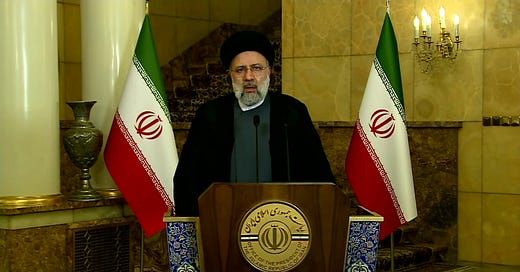Iran at UN: ISIS would be Europe's neighbor if not for Iran, Syria, Iraq
At the United Nations, Iranian President Ebrahim Raisi called US intervention "the biggest hindrance" to peace and stability, denouncing murderous American sanctions and the new cold war.
In the Western press, Iran is often portrayed as an irrational actor. Media propaganda depicts Iranians — like North Koreans, Syrians, Chinese, and people in any other Official Enemy country targeted by the United States for regime change — as crazy barbarians, using racist, colonial-esque tropes.
But if you listen to the speech Iranian President Ebrahim Raisi delivered to the United Nations General Assembly on September 23, you see the exact opposite is true: Iran is the nation promoting international law, peace, and stability; whereas it is the United States that is waging war around the world and overthrowing any government that refuses to obey it.
Raisi sent a message of cooperation. While stressing the commonalities shared by Abrahamic religions and calling for coexistence, the Iranian president condemned the United States for fueling disharmony, extremism, and terrorism.
If Washington had had its way, were it not for the resistance led by Iran, Syria, and Iraq, “ISIS would be the Mediterranean neighbors of Europe,” Raisi pointed out.
US interventions have only led to “blood-spilling and instability,” he said, recalling the CIA coup that overthrew his nation’s elected government in 1953.
Raisi called the ongoing US military occupations of Syria and Iraq the “biggest hindrance to the establishment of democracy” in West Asia, quipping, “Freedom does not fit in the backpacks of soldiers coming from outside the region.”
And the way Washington wages war on independent countries is shifting, he noted. Unilateral economic “sanctions are the United States’ new way of war with the nations of the world.”
The Iranian president stressed that “sanctions, and especially sanctions on medicine, at the time of the COVID-19 pandemic are crimes against humanity.”
Raisi is invariably demonized in the Western press as a “hardliner,” but his UN speech shows that Iranian leadership highly emphasizes rationality (a term he mentioned several times), diplomacy, and multilateralism.

“It has been our policy to strive for the preservation of stability and territorial integrity of all the countries of the region,” Raisi said.
“If not for the power and role of Iran, alongside the governments and peoples of Syria and Iraq, as well as the selfless efforts of martyrs Abu Mahdi al-Muhandis and General Qasem Soleimani, today, ISIS would be the Mediterranean neighbors of Europe,” he stressed.
The fact that Raisi named Soleimani and al-Muhandis is significant: both were murdered by the Donald Trump administration in a criminal act of war on January 3, 2020.
He is emphasizing that Washington murdered two of the most important figures in the fight against ISIS.
The Iranian president continued, warning that “ISIS will not be the last wave of extremism.”
Raisi indirectly criticized Washington’s new cold war on China and Russia, stating, “The new drive to come up with cold war-esque divisions will not help foster the security of humans, by isolating independent countries.”
In another jab at US support for extremist groups, he went on, “Even more bitter is the use of terrorism as an instrument for foreign policy, because you cannot fight terrorism with double standards. You cannot make a terrorist group such as ISIS in a certain place, and claim to fight it somewhere else.”
Finally, Raisi stated clearly, “The military presence of the United States in Syria and Iraq is the biggest hindrance to the establishment of democracy and will of nations.”
“Freedom does not fit in the backpacks of soldiers coming from outside the region.”

The Iranian president also condemned Washington’s addiction to military interventions and economic warfare.
“The United States’ hegemonic system has no credibility, whether inside or outside the country. What you see in our region today proves that not only the hegemonist and the idea of hegemony, but also the project of imposing Westernized identity have failed miserably.”
“The result of seeking hegemony has been blood-spilling and instability, and ultimately defeat and escape.”
“Today, the US does not get to exit Iraq and Afghanistan, but is expelled, and at the same time it is the oppressed people from Palestine and Syria to Yemen and Afghanistan, as well as the US taxpayers, who have to pay for this lack of rationality.”
“Today, the world doesn't care about ‘America first’ or ‘America is back.’ If rationality prevails in the minds of the decision-makers, they have to realize that nations' perseverance is stronger than the power of the superpowers.”
“Over the past decade, the US has been making the mistake of modifying its way of war with the world, instead of changing its way of life. An erroneous path cannot be brought to fruition by merely adopting a different method.”
“Sanctions are the US' new way of war with the nations of the world.”
“Sanctions against the Iranian nation started not with my country's nuclear program; they even predate the Islamic Revolution and go back to 1951, when oil nationalization went under way in Iran, which in turn led to a military coup backed by the Americans and the British against the then-government of Iran, which had been elected by the people.”
“Sanctions, and especially sanctions on medicine, at the time of the COVID-19 pandemic are crimes against humanity.”





